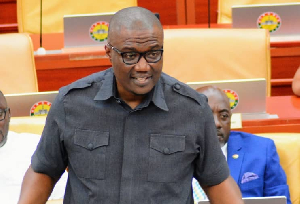The Minority in Parliament has raised concerns over the newly passed Ghana Medical Trust Fund Bill, 2025, popularly known as the MahamaCares Programme.
According to the Minority, the policy risks competing with or undermining the National Health Insurance Authority (NHIA) unless critical issues are addressed.
The bill, passed on Tuesday, July 22, 2025, under a certificate of urgency, aims to establish a dedicated fund to support specialized medical care for chronic and life-threatening conditions such as cancer, stroke, kidney failure, and diabetes.
However, the Minority, led by the Ranking Member of the Health Committee, Dr. Nana Ayew Afriye, has called for greater clarity to prevent overlap with the NHIA’s mandate and ensure sustainable financing.
Speaking at a press conference on Wednesday, Dr. Afriye highlighted the Minority’s objection to Clause 3A of the bill, which allocates 20% of NHIA funds to the Trust.
He argued that diverting such a significant portion of NHIA resources could weaken its ability to deliver primary healthcare services to Ghanaians, particularly the poor and vulnerable.
The Minority contends that this allocation could act as a “disguised capping” of NHIA funds, endangering equitable healthcare access.
Dr. Afriye emphasized that without clear delineation, the Trust’s operations could compete with NHIA services, especially in the treatment of non-communicable diseases (NCDs).
“At what point does the NHIA stop providing care, and when does the Trust take over?” he questioned, noting that the lack of clarity could confuse or delay patients seeking care.
He further highlighted a concerning provision requiring patients to apply for specialist care, a process that takes approximately two weeks.
“During this period, who ensures the patient’s care? This gap poses a risk to Ghanaians’ health,” Dr. Afriye warned.
The Minority further warned that the Trust could end up functioning as an outsourcing entity for the NHIA.
Dr. Afriye stressed that Ghanaians need clear guidance on where to seek care under the NHIA and where to seek care under the Trust to avoid confusion and ensure efficient healthcare delivery.
“So there are some questions that have to be answered. As far as we all want this trust to stand the test of time, and those questions if not answered, might imply that the trust is made to compete with the NHIS and also to weaken the NHIS.
“If these questions are clearly answered, then what we see is that the trust is more of an entity performing what we’ll see outsource function of the NHIS. That is what we see the trust to be doing. There’s a function of the NHIS, and it’s more of outsourcing some aspect of its work to the trust. If that is what the trust is meant to be, there should be clarity, and there should be clarity for Ghanaians to understand where to seek care with the NHIS and where to seek care with the trust,” he noted.
The Minority further raised concern over the funding source for the policy and proposed that the government considers allocating the COVID Levy which it had promised to scrap towards the MahamaCares.
The Ghana Medical Trust Fund, launched by President John Dramani Mahama on April 29, 2025, at the University of Ghana Medical Centre, is designed to provide financial assistance for NCDs not fully covered by the NHIA, such as cancers, cardiovascular diseases, and chronic kidney failure.
GA



